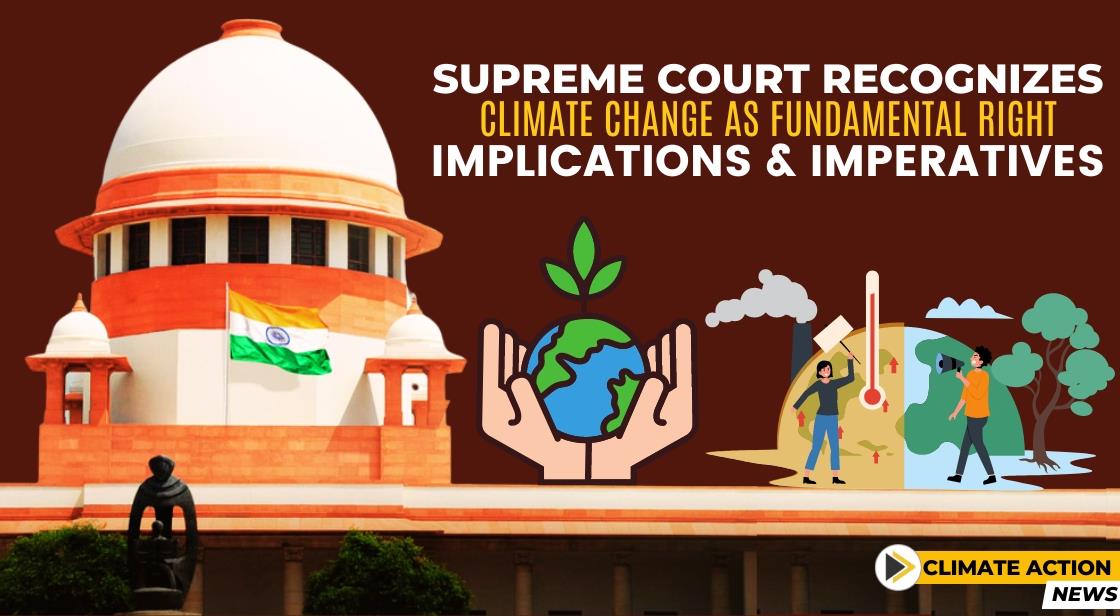Supreme Court Recognizes Climate Change as Fundamental Right: Implications and Imperatives

News Synopsis
In a landmark judgment, the Supreme Court has acknowledged the right against the adverse effects of climate change as a distinct fundamental right under the Constitution of India. This pivotal decision underscores the critical importance of environmental preservation and its intersection with human rights.
Background of the Judgment on Climate Change:
The judgment, released on April 6, emerged from a case concerning the survival of the endangered Great Indian Bustard species. While the case primarily focused on environmental concerns, the Court's deliberations expanded to address broader issues related to climate change and its impact on human rights.
Linkage to Fundamental Rights:
Chief Justice Chandrachud highlighted the intrinsic connection between the right against climate change and Articles 21 (right to life) and 14 (right to equality) of the Constitution. He emphasized that the realization of rights to life and equality is contingent upon ensuring a clean and stable environment.
Climate Change and Human Rights:
The Court underscored the profound implications of climate change on various human rights, including the right to health, indigenous rights, gender equality, and the right to development. It noted that environmental degradation disproportionately affects marginalized communities, exacerbating socio-economic inequalities.
Role of Solar Power:
Recognizing the urgent need for sustainable energy solutions, the Court emphasized the pivotal role of solar power in mitigating the adverse effects of climate change. India's vast solar energy potential presents an opportunity for effective harnessing of renewable energy sources to address environmental challenges.
India's Renewable Energy Goals:
India's ambitious target of achieving 500 GW of non-fossil-based electricity generation capacity by 2030 aligns with global efforts towards environmental sustainability. The country's significant investments in renewable energy infrastructure underscore its commitment to combating climate change and promoting sustainable development.
Socio-economic Benefits:
The transition to renewable energy sources not only enhances India's energy security but also yields socio-economic benefits. By reducing reliance on volatile fossil fuel markets and curbing air pollution, renewable energy technologies contribute to improved public health and reduced healthcare costs.
Policy Implications:
While acknowledging governmental efforts to address climate change, the Court highlighted the absence of comprehensive legislation specifically addressing climate-related concerns. However, it emphasized that the absence of specific laws does not negate the fundamental right of citizens to protection against the adverse effects of climate change.
Environmental Protection and Socioeconomic Benefits
India's commitment to transitioning to renewable energy sources is not only an environmental imperative but also a strategic economic move. Investing in renewables enhances energy security, reduces reliance on fossil fuels, and fosters public health by curbing air pollution. Furthermore, the adoption of clean energy technologies creates new socioeconomic opportunities.
Conclusion: A Turning Point for Environmental Protection and Human Rights
The Supreme Court's landmark judgment marks a pivotal moment in India's fight against climate change. By recognizing the right to a healthy environment as a fundamental right, the court empowers citizens and strengthens environmental protection efforts. This decision has far-reaching implications, not only for environmental policies but also for upholding fundamental human rights in the face of climate threats.
The focus on solar power as a critical solution underscores the need for a rapid shift towards renewable energy sources. India's vast solar potential positions it strategically to lead the way in clean energy adoption. The judgment serves as a powerful catalyst for India's ambitious renewable energy goals and its commitment to achieving net-zero emissions.
Looking ahead, the court's decision presents both opportunities and challenges. The legal framework for enforcing this newly recognized right will require further development. However, this landmark judgment undoubtedly paves the way for a future where environmental well-being and human rights are protected in tandem.
You May Like









